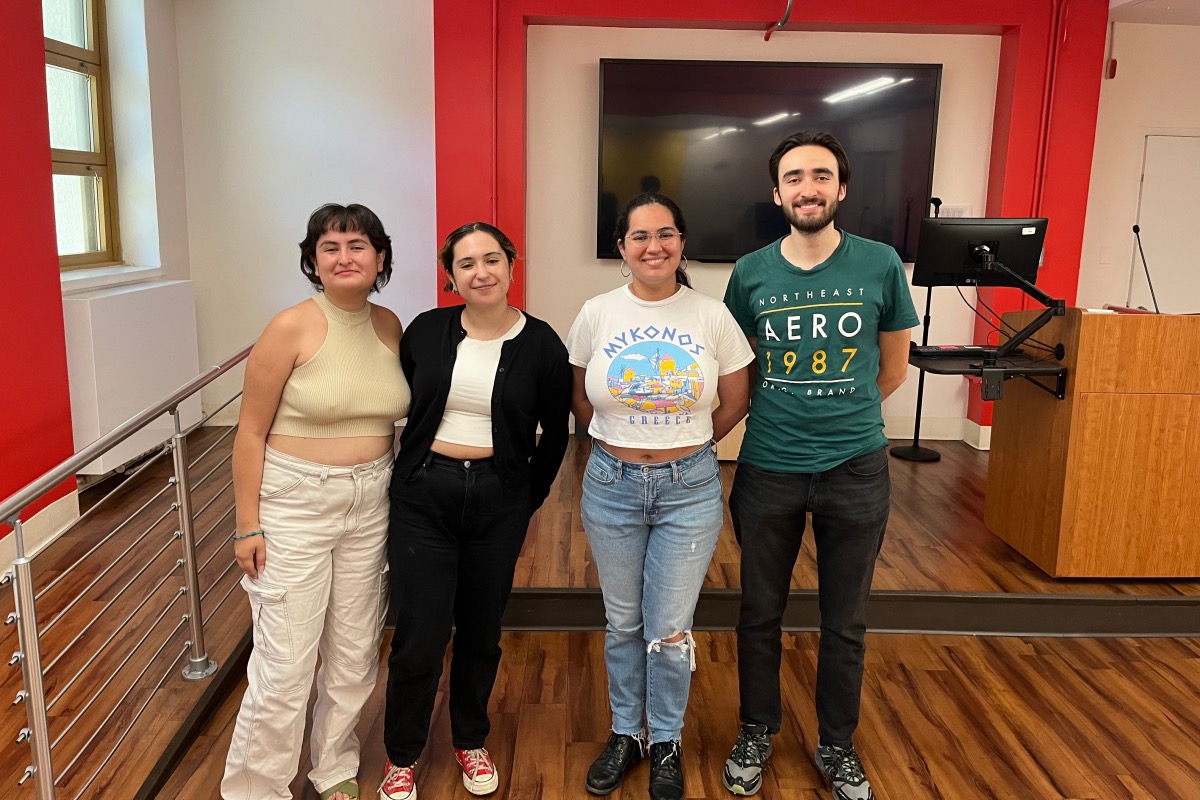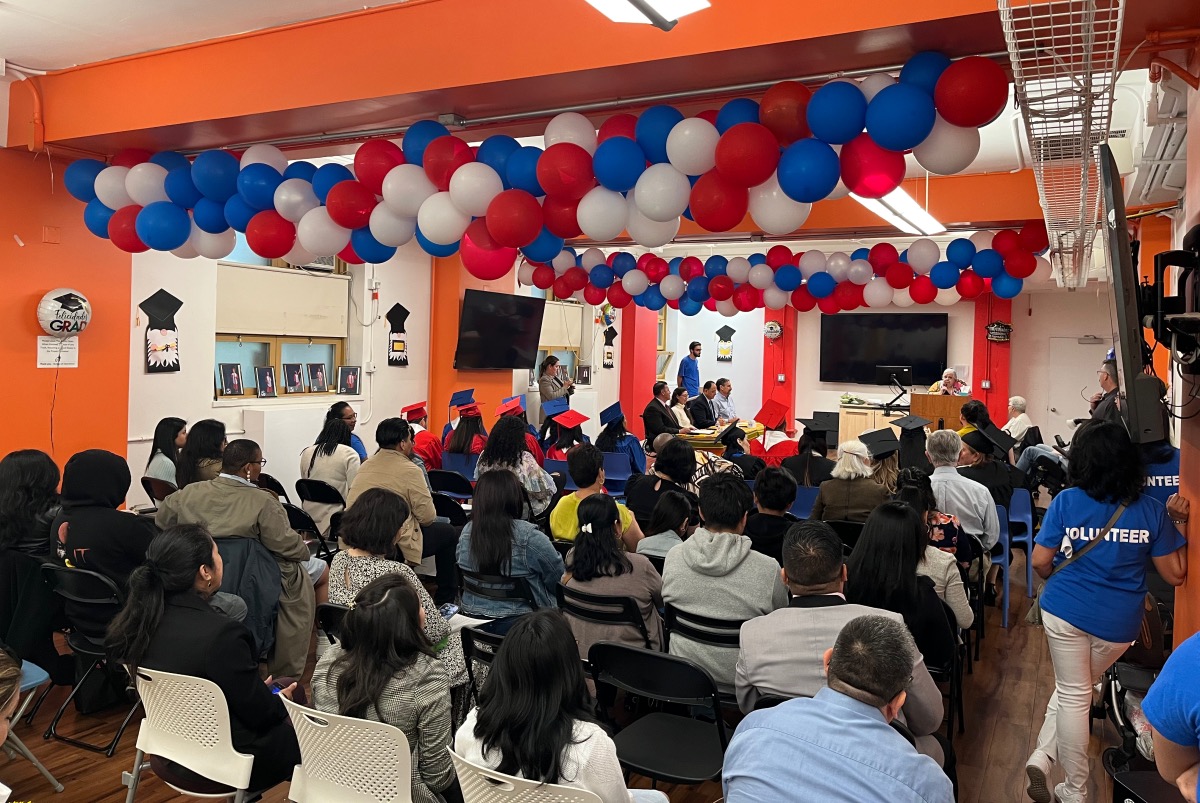

Student volunteers from Mexico City’s Universidad Iberoamericana teaching classes in New York City organized by Centro de Recursos Educativos Para Adultos (Illan Martin Ireland/Latino Rebels)
As a boy growing up on the outskirts of Mexico City, José Pérez always looked forward to going to school. But when his parents separated before his 11th birthday, he was forced to give up his studies and enter the working world.
“My family was very poor, and I had two sisters to take care of,” said Pérez, who left Mexico in his early 20s to start a new life in New York City. “I used to hang around construction sites and do odd jobs for cash.”
Upon arriving in New York, Pérez worked long hours as a delivery driver and, eventually, started a family of his own. Still, he never gave up hope that he might one day resume his education.
Pérez got that chance earlier this year thanks to Centro de Recursos Educativos Para Adultos (CREA), an organization offering formal schooling to Spanish-speaking adults across the city.
Founded in 2013, CREA aims to bolster education levels among Latino immigrants, helping them improve their Spanish literacy and achieve elementary and middle-school proficiency in multiple subjects. Students can also take classes to hone their English skills and prepare for their General Educational Development (GED) certification, opening the door to opportunities in higher education.
The organization has been transformative for adults like Pérez, who completed CREA’s elementary school curriculum 30 years after dropping out of primary school in Mexico.
“It’s like they’ve given me back my childhood,” said Pérez, who turned 43 earlier this year. “Every time I come to class, I feel like a boy again.”
CREA has grown significantly since its launch. Enrollment in its classes has increased fivefold over the past 10 years, surpassing 250 during the most recent semester. Students come from a dozen Central and South American countries and speak several languages besides Spanish, including Indigenous languages like Nahuatl and varieties of Mixtec.
The organization has also expanded its offerings beyond academics, adding a book club, computer classes, and workshops on identity, professional development, mental health and other topics.
“We base our services on the needs of our students,” said María Guadalupe “Lupita” Martínez, CREA’s founder and executive director. “If we know someone is experiencing domestic violence, for example, we provide them with the resources to address the situation and heal from it.”
Raised in Mexico City, Martínez moved to New York with her family in the early 2000s, joining the parent-teacher association at her children’s elementary school. Her inspiration for CREA came from observing that other immigrant parents avoided workshops and other academic activities at the school.
“I always use the example of a workshop for students and parents focused on 4th-grade math,” Martínez said. “If the student’s mother can’t read or write, why would she bother showing up?”


Recent CREA graduation ceremony in New York City, June 2023 (Illan Martin Ireland/Latino Rebels)
Martínez attributes CREA’s continued existence and growth to its passionate volunteers and international partnerships. The organization is recognized by the Mexican Ministry of Education as a Plaza Comunitaria, a space where Spanish-speakers can complete primary and secondary-level studies and receive certification from Mexico’s public education secretary. It also receives support from Mexico City’s Universidad Iberoamericana, commonly known as “La Ibero,” which sends students to New York City each semester to teach classes at CREA.
Several Ibero students were surprised at how rewarding it felt to guide adults through basic academic exercises.
“I was asked to cover a reading and writing class on my first day,” said Eduardo Rubio, 21, a history major at La Ibero who’s been teaching at CREA for the past two months. “It felt good knowing that I could give people tools that will serve them for the rest of their lives.”
Other volunteer instructors include students from local universities and members of the community looking to give back. Many said they were inspired by the tenacity and resolve of CREA students.
“They’re adults with a million worries and responsibilities, but at the end of the day they still come here to learn,” said Beatriz Soria, who’s taught middle-school math at CREA since 2019. “That motivates me to keep giving my time and teaching them.”
CREA has its fair share of challenges. The organization has lacked its own space since 2013, for one, forcing it to operate out of multiple community health centers in Upper Manhattan. Students must also balance biweekly classes and assignments with intense work schedules and family responsibilities—a difficult task that proves insurmountable for some.
“Sadly, there are many people who don’t stay with us for long,” Martínez said. “For many adults with jobs and families, studying just can’t be the priority.”
But students who manage to fit CREA into their schedules experience a jump in confidence and self-esteem, Martínez added. Many say they feel proud to serve as role models for their kids, while others appreciate forming part of a community of like-minded individuals.
“Every time you come to class, you feel like you’re looking in a mirror,” said Jorge Gomez, a native Colombian and aspiring chef who’s taken classes at CREA since 2019. “You’re surrounded by people who have the same goals and dreams and are fighting to achieve them.”
As for Pérez, his dreams have gotten bigger since joining CREA. During a graduation ceremony last month, he was among 21 students recognized for completing elementary or middle school or obtaining their GED certification—the largest graduating class in the organization’s history. The milestone has motivated Pérez to continue his education and even contemplate a career in medicine or law.
“It’s a real privilege to learn everything they teach me here,” he said. “Until they tell me there’s nothing left to study, I’ll keep coming back.”
***
Illan Martin Ireland is a summer correspondent at Futuro Media and a graduate of the Columbia University Graduate School of Journalism.



[…] The students teach CREA classes, which offer formal schooling to Spanish-speaking adults and have seen enrollment spike. — Latino Rebels […]